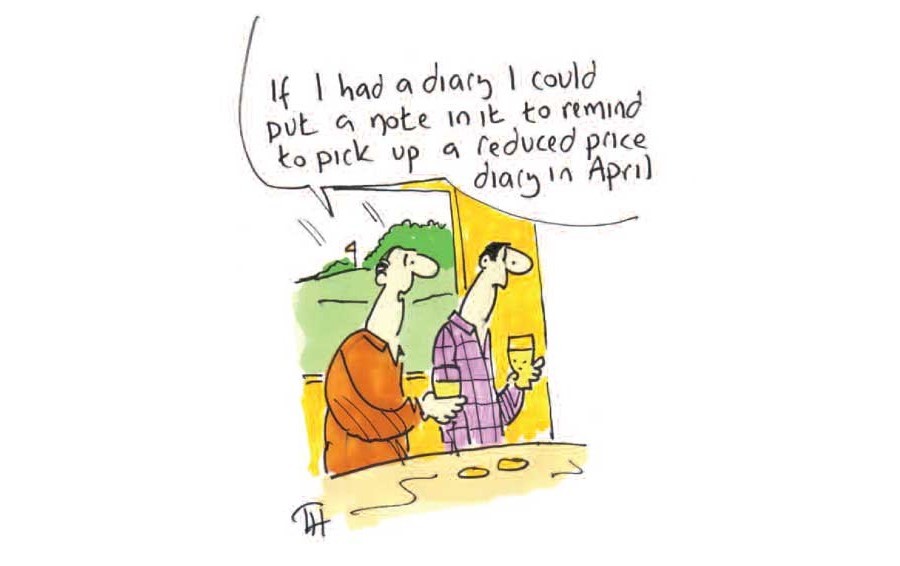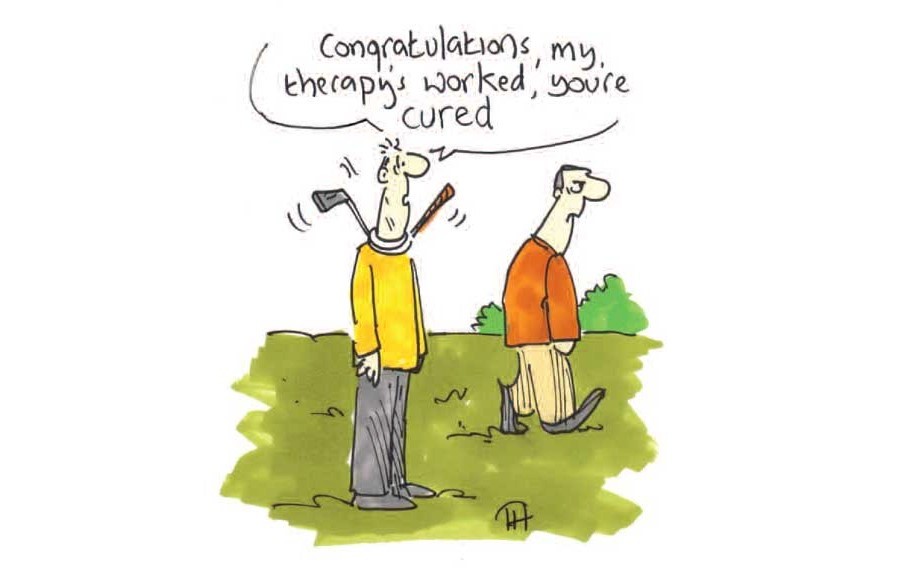Do you have a golf problem that’s keeping you awake at night?
Is there some aspect of your game that you simply can’t sort out?
Stop worrying because Dr Felix Shank, a more or less genuine expert on all aspects of the game, is here to help.
Illustrations by Tony Husband.

You are such a wise and learned man, I wonder if you could help solve a riddle that has perplexed me for several years. I am the pro at a pay-and-play course in the Midlands. In my shop we sell a range of golf balls from the very cheapest to the most expensive.
Because I’m interested in these things, every year I do a breakdown of the balls we’ve sold and every year the results are remarkably similar. Broadly, 45% are what might be called budget balls, 35% are mid range and 20% are top quality. Our green staff collect all the balls they find and flog them to me. A breakdown of these returned balls reveals a more or less equal split between the three categories. I want to know why more quality balls are being found than we sell?
P SAVIGEAR, OADBY, LEICESTERSHIRE
One possible explanation might be that your better quality balls are disproportionately expensive and that’s why you are more successful in selling budget balls.
That would possibly explain why visiting golfers have a higher proportion of better balls in their bags than you sell, which they then proceed to lose on your course. Because I’m not only ‘a wise and learned man’ but thorough as well, I looked at your prices and found them to be broadly in line with what others are charging and so the explanation has to lie elsewhere. Although I would need to carry out detailed empirical research to test my hypothesis, I believe I have hit upon a plausible explanation. Commonsense suggests that less well off golfers buy cheaper balls and are more distressed if they lose one. Consequently, they are inclined to search longer and more thoroughly than their wealthier counterparts, who are less reluctant to declare a ball lost.
Therefore, Felix Shanks’ First Law of Golf Balls states that the cheaper the ball, the less likely it is to be lost, which would explain the observations you have made on your course.

I am something of a collector and have a complete set dating from 1963 of a particular golf diary that lists all the tournaments, player stats and the like. The diary isn’t cheap and now that I live on a state pension I fear that I can no longer afford it and, very sadly, won’t be purchasing the 2011 edition. I’m upset on two counts: firstly, I’ve always noted in my diary every round I’ve played and that comprehensive record of my golf is now under threat; and secondly, my collection of diaries will no longer be complete.
RICHARD MAWBY, BRIGHTON
Diaries are an interesting commodity in that they are a perishable item that rapidly diminishes in value as the year progresses. Research carried by the John Maynard Keynes Institute reveals that they more or less maintain their retail value up until February 5th and then lose approximately one-and- a-half per cent of it every day thereafter. If you could afford a 2011 diary and had it in front of you now, you would be able to work out that diaries have effectively lost all their value by April 12th. Aware of this, retailers slash prices and, if you can hang on until early April, I’m absolutely certain that you will be able to purchase your beloved diary at a tiny fraction of its original price. However, there remains the problem of recording your scores in the interim.With the comprehensive collection of old diaries in your possession you should have no difficulty locating one that is configured in precisely the same way as 2011; that is to say one where January 1st falls on a Saturday, February 1st on a Tuesday, etc. You should have about half-a-dozen. For the time being, I suggest you record your scores in this old diary in pencil and then transfer them to your new diary in April.

Like so many others, I was completely enthralled by the Ryder Cup. I went to Celtic Manor on the Saturday and watched the rest on television and it was absolutely brilliant. Even though I’ve attended the birth of all three of my children, I honestly don’t believe that I’ve ever been so excited in my life. Since that magnificent October day, however, I’ve been generally rather gloomy. More specifically, I’ve struggled to generate any enthusiasm for golf. The two friends with whom I traditionally play in our club competitions are getting rather fed up with me crying off every time. My problem is that I somehow can’t see the point of it any more. Compared with the Ryder Cup, a midweek Stableford seems so futile.
ELLIOTT SIMMS, BATH
Oh dear, you would appear to have a severe case of what is clinically known as Priccs (Post Ryder Indifference and Crippled Capability Syndrome). It may comfort you to know that sports therapists up and down the country are presently dealing with several hundred sufferers on a regular basis. Essentially, the treatment aims to restore individuals’ competitive instincts by setting absurdly modest goals and offering ridiculously generous rewards if they are achieved. For example, you could win a new Ford Mondeo in return for sinking half-a-dozen, consecutive, three-foot putts. Patients’ angry response to being told that they haven’t actually won anything and that the whole exercise was simply therapy is regarded as confirmation that their indifference has disappeared and they have indeed been cured.
